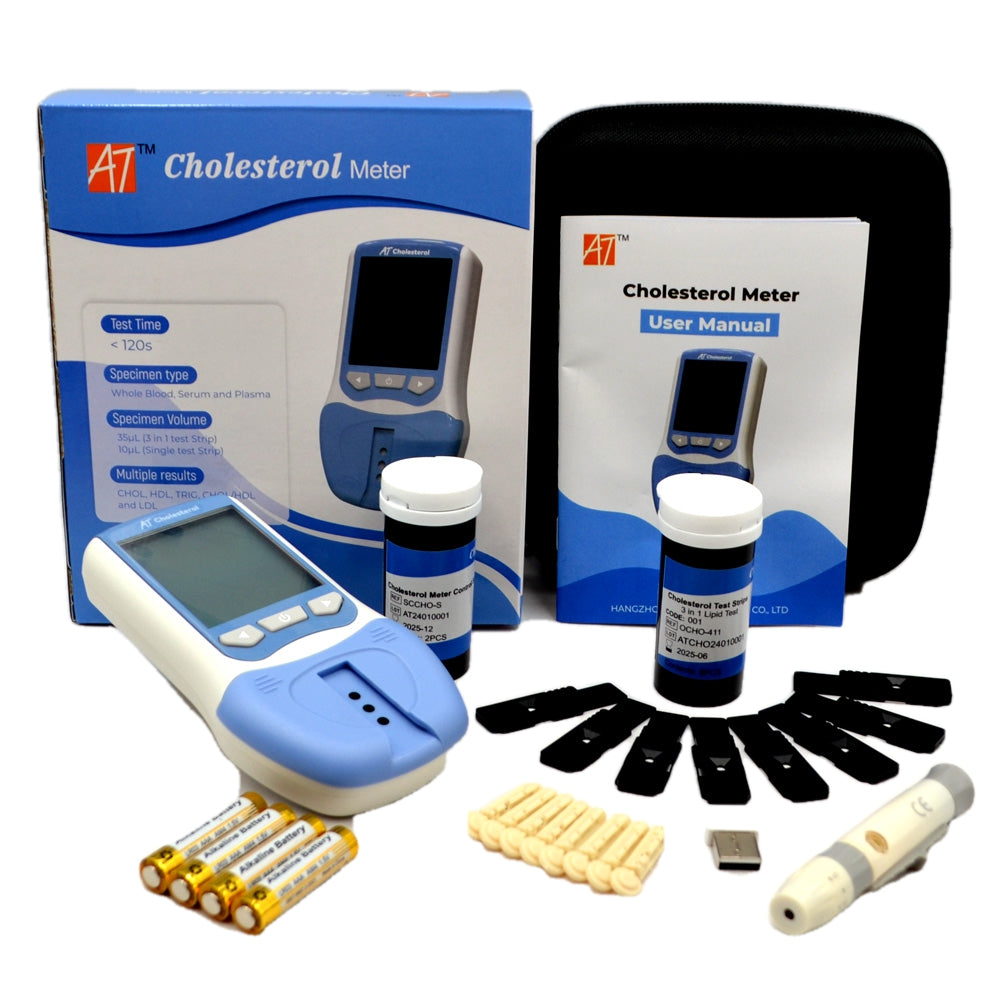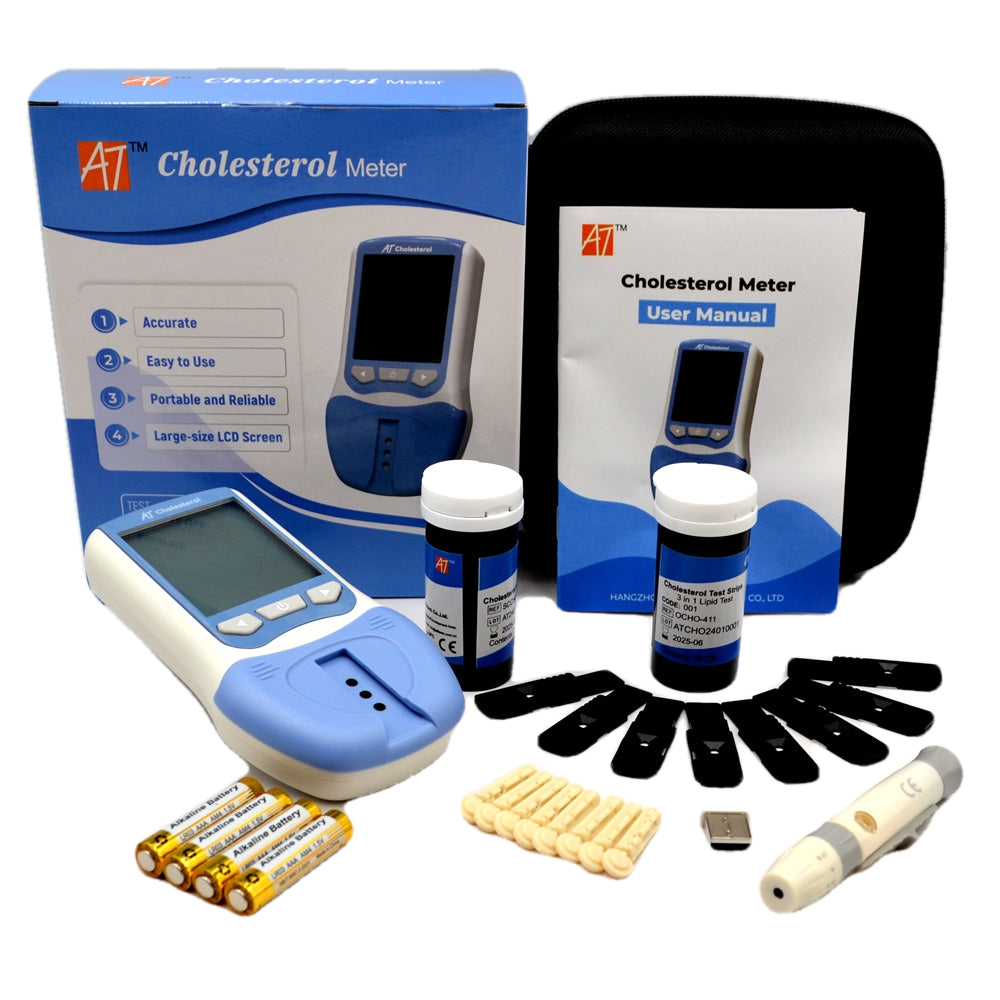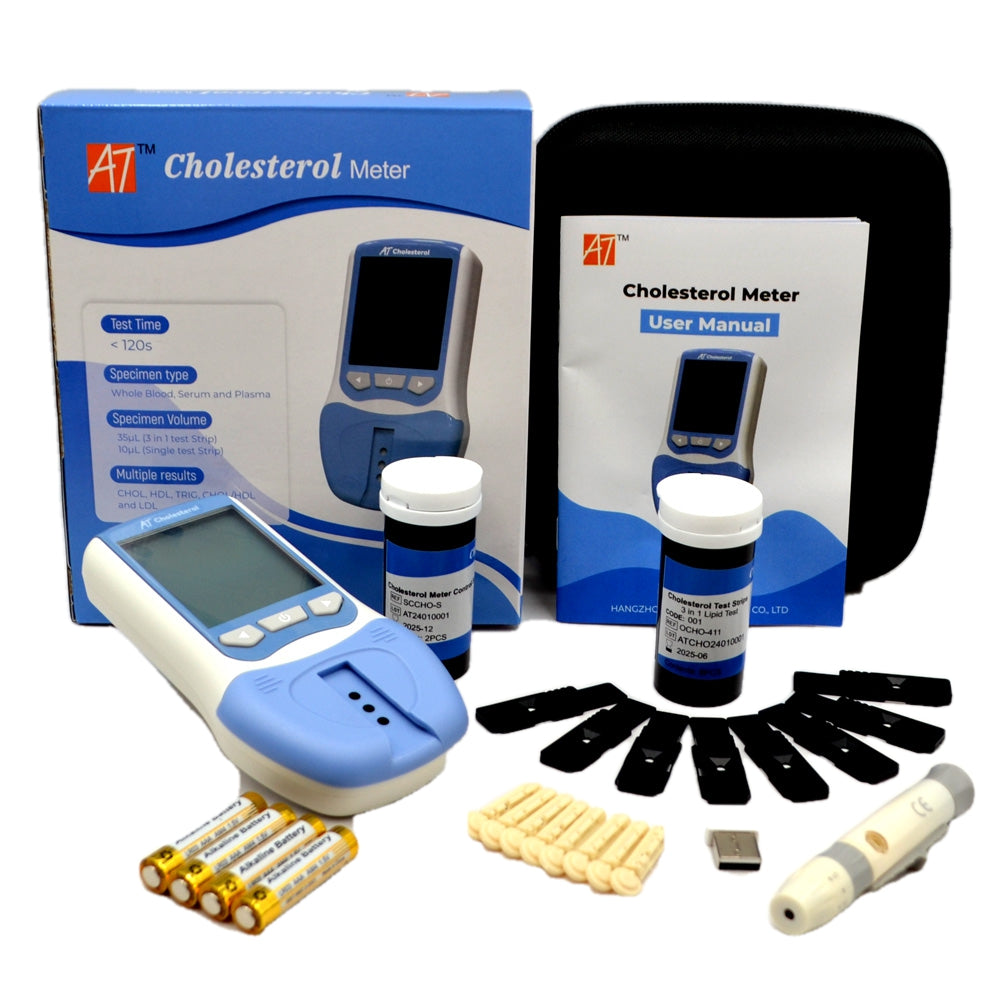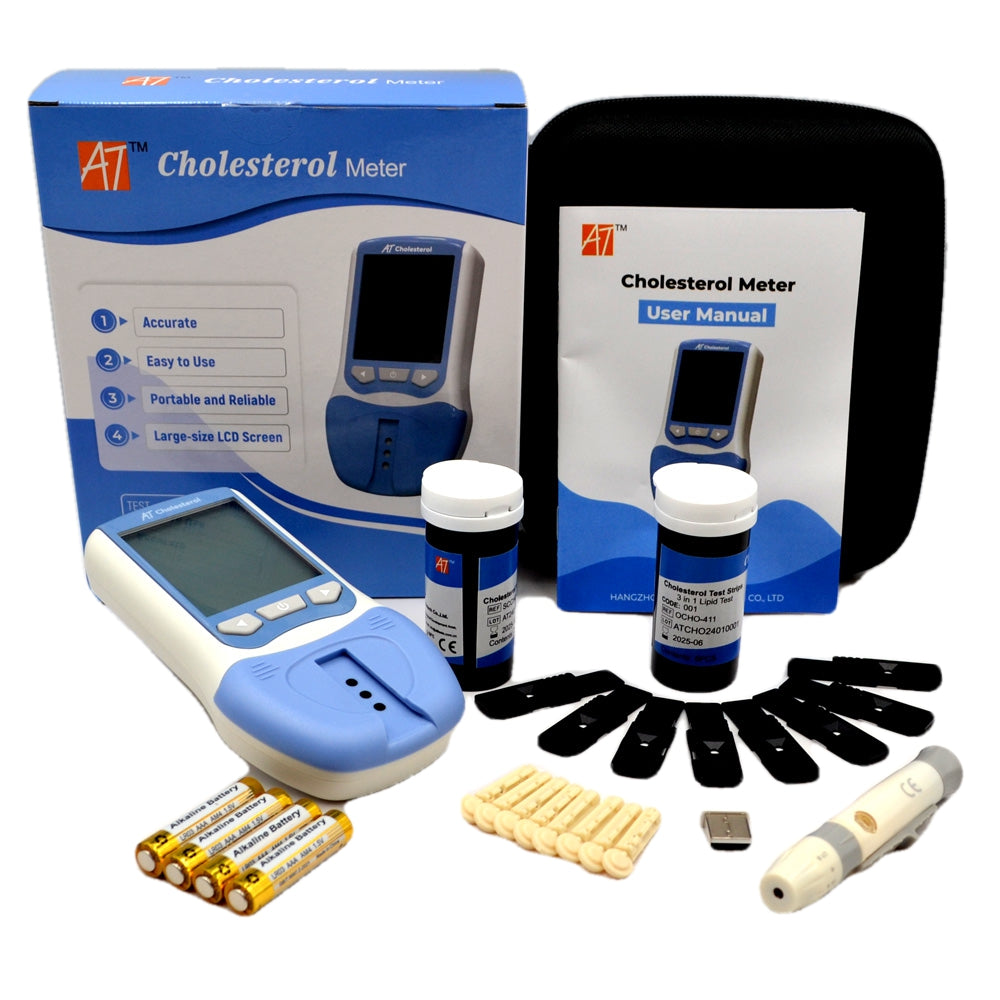Valuemed
AT Cholesterol 5 in 1 Meter + 8 Cholesterol Tests by Valuemed
AT Cholesterol 5 in 1 Meter + 8 Cholesterol Tests by Valuemed
Out of stock
Couldn't load pickup availability
The AT 5 in 1 Complete cholesterol monitoring system
This 5 in 1 combination cholesterol test kit and machine has been specifically manufactured to give accurate results using capillary finger prick peripheral blood samples (a finger prick blood sample)
Key features of the AT 5 in 1 cholesterol meter
- The AT 100ST digital Cholesterol meter offers a complete solution for accurate cholesterol testing and lipid monitoring has been designed to be used by both laboratory and professional clinical lipid testing.
- Fast, easy and reliable.
- Individual results: The 5 in 1 digital meter uses AT 3 in 1 test devices to measure actual blood real-time Total Cholesterol (TC) , High Density Lipoprotein (HDL) and Triglycerides (TG) on each test sample and then calculate the ratio of Total Cholesterol (TC) to HDL and Low-Density Lipoprotein Cholesterol (LDL) so 5 results are given on every sample
- 500 test memory.
- Fast analysis time of just 120 seconds per sample
- Switchable display scales (mmol/L -g/dL )
- The intuitive setup menu makes this one of the easiest cholesterol meters to actually live with and use regularly.
- CE0197 certified for European sales
Contents included in each AT Cholesterol meter pack box.
- Digital Cholesterol Meter
- 4 x AAA Batteries
- Instructions manual and Quick Reference Guide
- 8 Cholesterol Test Device/Strip and code chip
- 2 Cholesterol Meter check devices*
- 8 Sterile Tip Lancets and auto Lancing Device
- 8 Alcohol pads
- 8 Capillary Droppers
- Carry / Storage case
- Warranty card
Technical Specifications of the AT cholesterol meter
- Specimen volume 35 µL
- Display LCD
- Select Plasma (Pla) Serum (Ser) or Blood (Blo) options. Use Blo for finger prick samples venous blood and heparinised whole blood testing.
- Meter Size 139 mm × 68 mm × 27.5 mm 120g without batteries
- Memory. 500 records
- Auto Switch off. 5 minutes inactivity
- Battery life. 1000 tests
- Test time 2 minutes
- Measurable range
- Total Cholesterol : 2.59-12.93 mmol/L (100-500 mg/dL )
- HDL Cholesterol : 0.39-2.59 mmol/L (15-100 mg/dL)
- Triglycerides : 0.51-7.34mmol/L (45-650 mg/dL)
- Can be switched to test venous blood and plasma/serum samples for use in professional and healthcare screening environments.
- English and Chinese display language menu options
- *The meter function can be tested using the check devices (2) supplied with the meter. These check devices can be reused multiple times for 24 months after opening.
Refill packs of 20 AT 3 in 1 Cholesterol test devices are available specifically for this Cholesterol meter. (each test gives 5 results as LDL and Cho/HDL are calculated.)
A UK power plug and USB data cable are also available to purchase separately for this meter if required.
Please watch our full Meter demo Video before performing your first cholesterol test
How to perform an accurate finger prick capillary blood test with the AT
Share
Collapsible content
Should I do a fasting or non-fasting cholesterol test?
If your Total Cholesterol levels are in the normal range there is usually no need to test after fasting.
However, if your results indicate an elevated total cholesterol or high level of Triglycerides, over 1.7 mmol/L, then it is best to move to cholesterol testing after fasting for between 9 and 12 hours. This can easily be achieved by not eating after 7 pm and testing first thing the following morning.
How to interpret your cholesterol test results
Cholesterol Test Results
Some of the Cholesterol meters just displaty total cholesterol and some display 5 results for each completed blood test. Results are displayed in one of 2 scale options you can select, mmol/L or mg/dL. In the UK most cholesterol level results will be given in mmol/L.
Total Cholesterol
A normal Total Cholesterol level is below 5.0 mmol/L (200mg/dL) Above 5.0 but below 6.18 mmol/L is considered borderline elevated. Above 6.20mmol/L is considered high.
A high total cholesterol level can increase your risk of cardiovascular disease. However, decisions about when to treat high cholesterol are usually based upon the level of LDL or HDL cholesterol rather than the level of total cholesterol.
Total cholesterol levels can be tested at any time of day but the LDL and Triglyceride levels can vary depending on what has been recently eaten. For this reason, fasting (9-12hr) total cholesterol measurement is preferred by most doctors where either of the above two is elevated.
HDL
HDL or High-Density Lipoprotein is a good element and levels of over 1.55mmol/L (60mg/dL) are excellent. Levels between 1.00 mmol/L and 1.55 mmol/L are normal. Below 1.0 mmol/L are unhealthy. Men tend to have lower HDL levels than women 1 versus 1.2 mmol/L an ideal to aim for is 1.4 mmol/L
LDL
LDL or Low-Density Lipoprotein Cholesterol often referred to as bad cholesterol increases cardiovascular disease risk and Levels should be kept below 3.0 mmol/L
Triglycerides
High triglyceride levels are also associated with an increased risk of cardiovascular disease.
Triglyceride levels are assessed as follows:
●Normal – Less than 1.7 mmol/L (150 mg/dL)
●Mildly increased – 1.7 to 5.6 mmol/L (150 to 499 mg/dL)
●Moderately increased – 5.6 to 10 mmol/L (500 to 886 mg/dL)
●Very high – Greater than 10 mmol/L (886 mg/dL)
If your Cholesterol levels are abnormal we can not give personal or medical advice, so please discuss the findings with your Doctor, Nurse, or Pharmacist.
How do I know if the cholesterol meter is accurate ?
While learning to use the cholesterol meter it is not uncommon for results to vary considerably between tests.
Here is a list of tips on getting consistently accurate results from your cholesterol meter:
1) Always lance the side of the finger, never the flat surface or pulp. The side of the finger is far more vascular and bleeds profusely. Wipe the first drop away and allow a large second drop to form naturally, without squeezing the finger. This technique is critical in getting accurate results. A bad lance technique is the main cause of wildly fluctuating results.
2) Dont expect the total cholesterol levels to be the same each time. Cholesterol levels have a diurnal variation and are naturally dynamic, see 3.
3) If your Triglyceride level is above 1.7mmol/L then you should move to testing while fasting as the Triglyceride levels will vary with meals and significantly affect the other readings on your meter.
4) You can check the meter function using one of the Test Devices supplied with the original meter starter pack. We have embedded a video demonstration of a device test in the product listing above.
5) Exclude medical and medication causes for the unexplained results, see below..
Can you give me any tips on obtaining the finger prick blood sample?
Obtaining a good finger prick blood sample is crucial to getting accurate results with any home blood test. We have created a video for each product which shows a great demonstration of exactly how you should be using the lancets and test provided, and the prep needed to perfuse the fingers.
We have put together our top tips on performing a finger prick blood test to help you here
Are there any medical conditions which would prevent me getting accurate cholesterol results?
Yes there are a few medical conditions and drug supplements that can interfere with your cholesterol test results.
Please consider the following if you are not getting consistent or accurate readings with your cholesterol meter:
- High dose Vitamin C. Ascorbic Acid supplements, often as part of multivitamins or taken on their own will interfere with results. If they are not prescribed and it is possible to stop taking Vitamin C in high dose, cholesterol testing can be resumed after 7 days.
- High Bilirubin levels in the blood will interfere with cholesterol test results. The level may be below that required to cause clinical jaundice. Raised bilirubin levels in the blood can occur in many medical conditions including anaemia, cirrhosis, following a blood transfusion, Gilbert syndrome—a common, inherited condition in which there is a deficiency of an enzyme that helps break down bilirubin, viral hepatitis, gall bladder disease, as a reaction to drugs (including statins) and in alcoholic liver disease.
- High urate levels can result from renal disease and early kidney failure but can also be caused by many other things including dehydration, diuretics (water retention relievers), drinking too much alcohol, drinking too much soda or eating too much of foods that contain fructose, a type of sugar, high blood pressure (hypertension), Immune-suppressing drugs, Leukemia.
- Haemolysis, the breakdown of large numbers of blood cells. Routinely follows a blood transfusion, but can also occur after trauma, surgery, and in a range of blood and bone marrow diseases.
With the exception of Vitamin C and prescribed drugs, most of the above will require medical investigation to confirm the underlying cause, but is worth considering if the cholesterol meter check device test is normal and the lancing technique, sample collection, and procedure are all correct. Please just don't blame the meter, or ignore the results, the problem may in fact be you! It could be something that you are taking or that you have an underlying medical condition that you may be completely unaware of!




